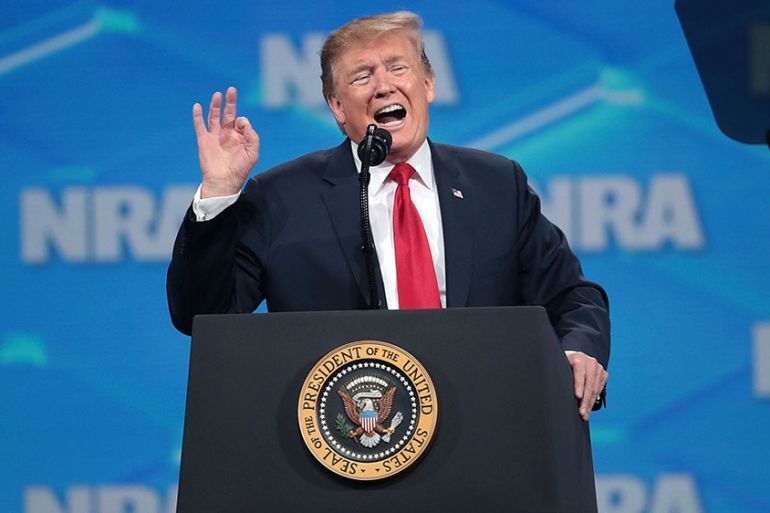Trump heeds NRA, says he’s pulling US out of Arms Trade Treaty
Trump tells gun lobby he intends to revoke status of US as a signatory of the treaty, which wasn’t ratified by Senate.

US President Donald Trump announced on Friday at the National Rifle Association’s (NRA) annual meeting that the United States will drop out of an international arms treaty signed in 2013 by then-President Barack Obama but opposed by the NRA and other conservative groups.
Trump told members of the gun lobby that he intends to revoke the status of the US as a signatory of the Arms Trade Treaty, which was never ratified by the US Senate.
Keep reading
list of 4 itemsSix takeaways from first day of Trump’s New York hush money criminal trial
Day 1 of Donald Trump’s first criminal trial
What is Donald Trump’s ‘hush money’ trial all about?
“We’re taking our signature back,” Trump said to thousands of cheering attendees, many wearing red hats emblazoned with the Republican president’s “Make America Great Again” slogan.
The NRA has long opposed the treaty which regulates the $70bn business in conventional arms and seeks to keep weapons out of the hands of human rights abusers. The lobbying group argues it would undermine domestic gun rights, a view the Obama administration rejected.
Trump added that the United Nations will soon receive formal notice of the withdrawal.
The 193-nation UN General Assembly overwhelmingly approved the treaty in April 2013 and the US, the world’s top arms exporter, voted in favour of it despite fierce opposition from the NRA.
‘Re-open the floodgates’
Trump’s action drew an immediate rebuke from some international human rights groups.
“The United States will now lock arms with Iran, North Korea and Syria as non-signatories to this historic treaty whose sole purpose is to protect innocent people from deadly weapons,” said Oxfam America President Abby Maxman.
Adotei Akwei, of Amnesty International USA, said in a statement, “With this announcement the Trump administration will re-open the floodgates for arms sales with weakened human rights criteria.”
So far, 101 countries have formally joined onto the treaty. Another 29, including the US, have signed it, but not yet formally joined.
Trump was joined on his trip to Indianapolis by White House National Security Adviser John Bolton, an advocate of withdrawing the US from international treaties out of concern they might undermine US authority.
With Friday’s announcement, Trump continued his drive to roll back Obama-era initiatives.
Nearly two years ago, Trump announced that the US would withdraw from the Paris Climate Agreement, which aims to reduce global carbon emissions that scientists link to harmful climate change. Republicans argue the US economy would suffer if it met the deal’s carbon-reduction goals. He has also pulled the US out of the landmark 2015 Iran nuclear deal.
Public sentiment shifts
Trump’s announcement on Friday came as he vowed to fight for gun rights, saying Second Amendment is “under assault”, but “not while we’re here”.
And in a pre-emptive attack against his 2020 Democratic challengers, Trump claimed without evidence that the other party wants “to take away your guns”.
An emboldened NRA had high hopes and ambitious plans for easing state and national gun regulations after pouring tens of millions of dollars into the 2016 presidential race, seeing its dark horse candidate win and Republicans in control of both branches of Congress.
But much of the legislation the group championed has stalled, due, in part, to a series of mass shootings, including the massacre at a Parkland, Florida, high school that left 17 dead and launched a youth movement against gun violence that has had a powerful impact. And Democrats won control of the House in the midterms.
At the same time, the group is grappling with infighting, bleeding money and facing a series of investigations into its operating practices.
The NRA, said Adam Winkler, a UCLA law professor and expert on gun policy, has dramatically changed its messaging over the last two years, with its NRATV service advocating a panoply of far-right political views that have turned off some members.
At the same time, public sentiment has shifted. A March AP-NORC poll found that 67 percent of Americans overall think gun laws should be made stricter – up from 61 percent in October 2017. And a June 2018 Gallup poll found overall favourable opinions of the NRA down slightly from October 2015, from 58 percent to 53 percent. Unfavourable views have grown from 35 percent to 42 percent.
Against that backdrop, Democratic politicians have become more comfortable assailing – and even actively running against – the NRA and pledging action to curb gun violence. And gun control groups like Everytown, which is largely financed by former New York City Mayor Michael Bloomberg, and a political action committee formed by Gabby Giffords, the former Arizona congresswoman wounded in a shooting, have become better organised and more visible, especially at the state level.
That reversal was made clear during the 2018 midterm elections, when those groups vastly outspent the NRA.
Winkler said that the group had scored some victories under Trump, including the appointment of two Supreme Court justices who may be open to striking down gun laws.
But overall, he said, “On the legislative front, the NRA has been frustrated”, with priorities like national reciprocity for concealed carry laws and a repeal of the ban on silencers stalled.
Instead, Trump introduced a new federal regulation: a ban on bump stocks after a man using the device opened fire on a crowd of concertgoers on the Las Vegas strip, killing 58 people and wounding hundreds.